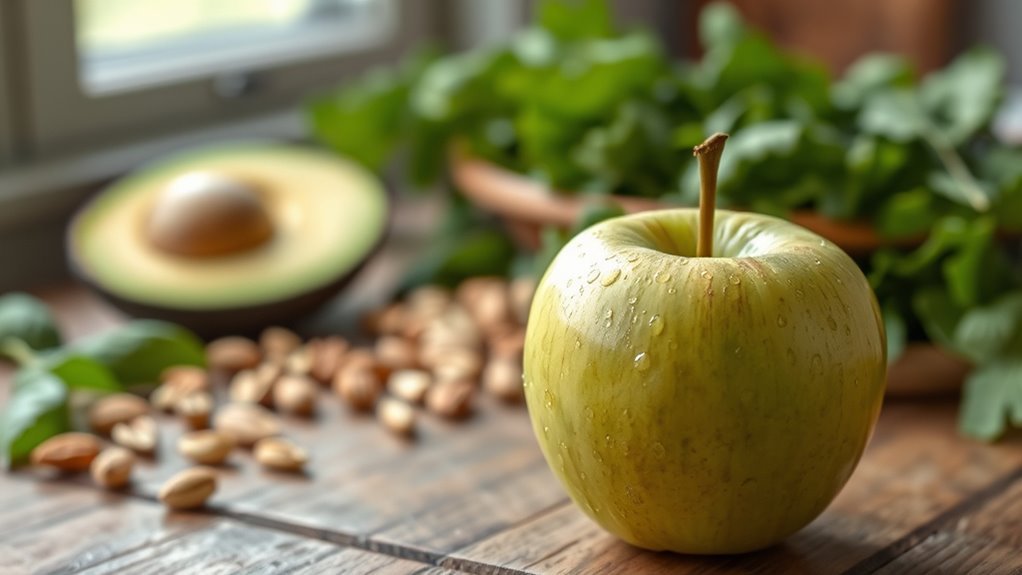You can eat apples on a ketogenic diet, but you’ll need to be mindful of their carbohydrate content. A medium apple contains around 25 grams of carbs, which can impact your ketosis goals. While apples are rich in fiber and essential nutrients, it’s important to balance your intake with other low-carb foods. Enjoy them in moderation or consider alternatives like berries or avocados for lower carb options. Discover more about how to incorporate fruit into your keto plan for better results.
Understanding the Ketogenic Diet

When you plunge into the ketogenic diet, it’s essential to understand its core principles and mechanics. The keto principles revolve around drastically reducing carbohydrate intake while increasing fat consumption, which shifts your body into a state of ketosis. In this state, your body becomes efficient at burning fat for fuel instead of carbohydrates. There are various diet variations within the ketogenic framework, such as targeted or cyclical keto, each tailored to specific lifestyle needs. By grasping these fundamentals, you’ll empower yourself to make informed choices and navigate your journey with confidence. Remember, understanding the underlying science is vital for achieving sustainable results and enjoying the freedom that comes with a well-structured ketogenic approach.
Nutritional Profile of Apples

Apples are a popular fruit known for their crisp texture and sweet flavor, but their nutritional profile may raise questions for those following a ketogenic diet. These fruits offer various nutritional benefits, including vitamins A and C, potassium, and fiber, which are essential for overall health. Different apple varieties, like Fuji, Honeycrisp, and Granny Smith, provide unique flavors and textures, along with slightly varying nutrient profiles. For instance, some may have higher antioxidant levels, which can support your immune system. While apples are nutritious, it’s important to be mindful of their carbohydrate content, especially if you’re aiming for ketosis. Balancing your apple intake with other low-carb foods can help you enjoy their benefits while staying aligned with your dietary goals.
Carbohydrate Content in Apples

When considering apples on a keto diet, understanding their carbohydrate content is essential. A medium-sized apple typically contains about 25 grams of carbohydrates, which can impact your daily intake. It’s important to factor in serving sizes to guarantee you stay within your carbohydrate limits while still enjoying this fruit.
Apple Carbohydrate Breakdown
Although many fruits are often discouraged on a ketogenic diet due to their carbohydrate content, understanding the carbohydrate breakdown of apples can help you make informed choices. A medium apple typically contains around 25 grams of total carbohydrates, with about 19 grams being natural apple sugar. However, apples also boast a decent fiber content, around 4 grams per fruit. This fiber can help mitigate the impact of the sugars on your blood glucose levels, making apples a more balanced option. If you’re mindful of your daily carb intake, knowing that the net carbs (total carbs minus fiber) in an apple are about 21 grams can guide you in fitting them into your keto lifestyle. Enjoying apples occasionally can add variety to your diet.
Serving Size Considerations
While you might enjoy the crisp taste of apples, it’s essential to take into account serving sizes to manage your carbohydrate intake effectively on a keto diet. To help you maintain portion control, consider these serving suggestions:
- Aim for a small apple (about 4 oz) which contains roughly 15-20 grams of carbs.
- Pair apple slices with high-fat dips like almond butter for balanced nutrition.
- Use apples as a garnish rather than the main ingredient in dishes.
- Consider apple-flavored extracts or spices to enjoy the taste without excess carbs.
- Monitor your overall daily carbohydrate limit to stay within your keto goals.
Comparing Apples to Other Fruits
How do apples stack up against other fruits in a keto diet? When you consider apple varieties, you’ll find that they generally contain more carbs than many low-carb fruits like berries. For instance, a medium-sized apple can have around 25 grams of carbs, while a cup of raspberries has only about 15 grams. This makes fruit comparisons essential for maintaining ketosis. Other fruits like avocados and olives are even lower in carbs, making them more suitable for a keto lifestyle. If you’re craving sweetness, opting for smaller portions of berries or even focusing on lower-carb options could help you stay within your carb limit while still enjoying fruits. Balancing enjoyment and nutritional needs is key in your keto journey.
Benefits of Eating Apples on Keto
If you’re considering incorporating apples into your keto diet, it’s important to recognize that they can offer several benefits despite their higher carb content. Apples, particularly certain apple varieties, can provide essential nutrients that support your overall health. Here are some key benefits:
- Fiber-rich: Helps with digestion and can promote a feeling of fullness.
- Vitamins and minerals: Loaded with vitamin C and potassium, which are vital for immune function and heart health.
- Antioxidants: May help reduce inflammation and oxidative stress.
- Low-calorie option: Makes for a satisfying keto snack without excessive calories.
- Versatile: Can be enjoyed raw, baked, or added to salads for variety in your meals.
Incorporating apples mindfully can enhance your keto experience.
Tips for Incorporating Apples Into Your Keto Diet
Incorporating apples into your keto diet can be both enjoyable and beneficial, as long as you choose the right varieties and manage your portions. Opt for lower-carb apple varieties like Granny Smith or Honeycrisp, which can satisfy your sweet tooth without derailing your carb count. You can create delicious keto recipes by slicing apples and pairing them with almond butter or incorporating them into salads for added crunch. Consider using apples in moderation as a natural sweetener in baked goods made with almond or coconut flour. Remember, balance is key—keep track of your carb intake to guarantee you’re staying within your limits while enjoying the unique flavors that apples bring to your meals.
Alternatives to Apples for a Low-Carb Diet
While apples can be a tempting choice for those following a low-carb diet, there are plenty of alternative fruits and snacks that can fit seamlessly into your meal plan. Consider incorporating these options instead:
- Low carb berries: Strawberries, raspberries, and blackberries are great choices, high in fiber and antioxidants.
- Avocado: Packed with healthy fats, it can be used in salads or smoothies.
- Cucumbers: A revitalizing, crunchy option that works well in salads.
- Zucchini: Versatile in dishes, it can be spiralized or grilled.
- Olives: A savory snack rich in healthy fats.
These keto-friendly vegetables and fruits not only support your low-carb lifestyle but also add variety and essential nutrients to your diet. Enjoy the freedom of choice!
Making Smart Choices When Eating Fruits on Keto
When following a keto diet, making informed decisions about fruit consumption is essential for maintaining your carbohydrate limits. Focus on fruit selection that aligns with your dietary goals. Berries, for example, are lower in carbs compared to other fruits and can be enjoyed in moderation. Prioritize portion control to help you stay within your daily carb intake. A small serving of raspberries or strawberries can satisfy your sweet tooth without derailing your progress. Avoid high-sugar fruits like bananas and grapes, as they can quickly push you over your carb limit. By being mindful of your choices and portions, you can enjoy the freedom of including fruits in your keto lifestyle while staying committed to your health goals.
Frequently Asked Questions about Eating Apples on Keto
1. Can I eat apples on a keto diet?
While apples are nutritious and provide various health benefits, they are relatively high in carbohydrates compared to other low-carb fruits. A medium-sized apple contains about 25 grams of carbs, which can take up a significant portion of your daily carb allowance on a ketogenic diet. If you choose to eat apples, it’s essential to keep your portion sizes small and monitor your overall carb intake for the day.
2. What are the best low-carb alternatives to apples on keto?
If you’re looking for low-carb alternatives to apples while following a keto diet, consider options such as berries (like raspberries and strawberries), avocados, cucumbers, or olives. These fruits and vegetables are lower in carbohydrates and can provide a similar crunch or sweetness without exceeding your carb limits.
3. How can I incorporate apples into a keto diet if I really want to?
If you want to include apples in your keto diet, consider using them in moderation. For example, you can slice a small apple and use it as a topping for a salad, combine it with a high-fat dip like almond butter, or use a tiny amount of apple in a recipe to add flavor without overloading on carbs. Always measure your portions and adjust the rest of your carbohydrate intake accordingly.
4. What are the nutritional benefits of apples?
Apples are a good source of dietary fiber, vitamin C, and various antioxidants. They can help support digestive health, boost the immune system, and provide a range of phytonutrients that contribute to overall health. However, it’s important to weigh these benefits against their carbohydrate content when following a ketogenic diet.
5. What is the impact of eating apples on ketosis?
Eating apples in moderation may not necessarily kick you out of ketosis if you carefully manage your total daily carb intake. However, consuming larger quantities could potentially lead to exceeding your carbohydrate limit, which could disrupt your state of ketosis. It’s crucial to track your carb intake and choose low-carb foods predominantly to maintain ketosis effectively.
References
- https://www.healthline.com/nutrition/keto-diet-foods#fruits
- https://www.livescience.com/58889-keto-diet-fruits.html
- https://www.ncbi.nlm.nih.gov/pmc/articles/PMC6520897/
- https://www.mayoclinic.org/healthy-lifestyle/nutrition-and-healthy-eating/expert-answers/keto-diet/faq-20476181
- https://www.medicalnewstoday.com/articles/323463
- https://www.dietdoctor.com/low-carb/keto/fruits
- https://www.webmd.com/diet/what-is-the-keto-diet
- https://www.cdc.gov/healthyweight/assessing/bmi/adult_bmi/english_bmi_calculator/bmi_calculator.html


